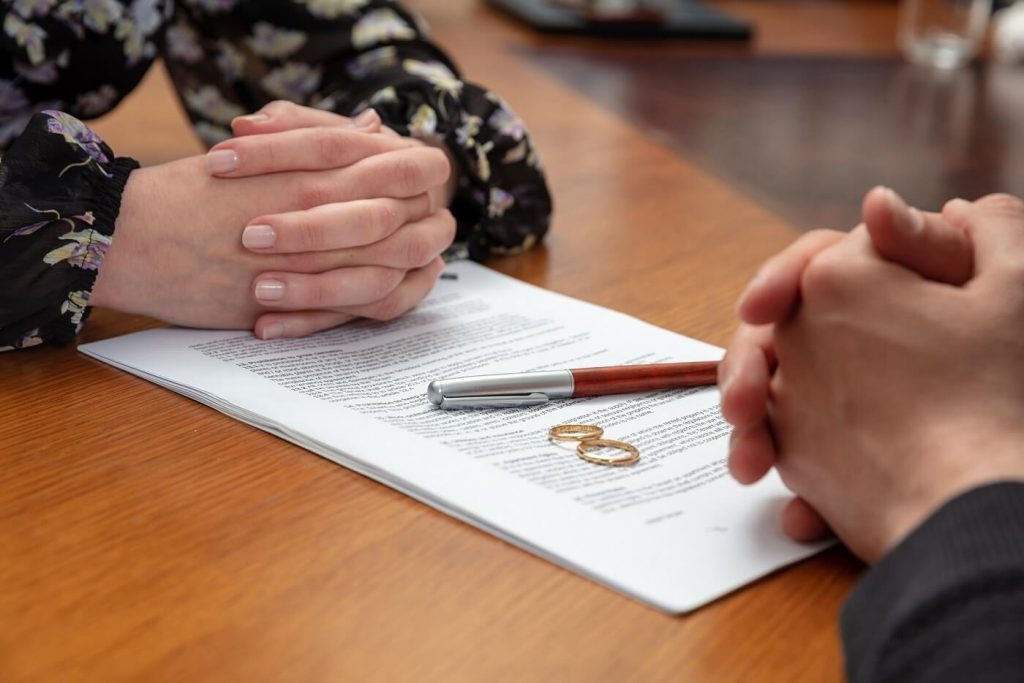A wife is not entitled to any type of property, support, or custody rights because of her gender. According to Virginia law, marital property, including assets and debts acquired during the marriage, is subject to equitable distribution. The court considers various factors, such as the length of the marriage, each spouse’s financial resources, and contributions to the marriage, to determine a fair division of property.
Let’s explore divorce entitlements, what property a wife can get during a divorce in Virginia, how properties are divided, and the considerations involved in determining their value.
What Property Rights Do Wives Have in a Divorce?
According to the Virginia divorce laws, the division of property and allocation of assets to a wife are determined by a range of factors and specifics of the divorce case rather than gender.
In the context of property division, both partners can receive a reasonable portion of assets and debts accumulated during the marriage. Assets subject to division include properties, vehicles, financial holdings, investments, businesses, and personal possessions.
How Are the Properties Divided?

Virginia follows the principle of equitable distribution, which ensures that marital property is divided between spouses in a fair manner, though not necessarily in equal shares.
When determining what a spouse is entitled to in a divorce, the court considers a range of factors which include, but are not limited to:
● duration of the marriage;
● whether there are minor children and who the custodian will be;
● each spouse’s monetary and non-monetary contributions to the marriage;
● earning potential of each spouse;
● current financial needs of both parties.
What Are the Two Divisions of Property in Virginia?
There are two classes of property – marital and separate, and the type of property owned by spouses directly influences its division during a divorce. Checking the property division principles before filing for divorce will help spouses navigate the complexities of the process and protect their legal interests.
Marital Property
Marital property refers to assets and debts that a couple managed to get during their marriage. This property type is viewed as jointly owned by both spouses.
According to Virginia marital property laws, such property can include:
● real estate;
● financial accounts;
● vehicles;
● investments;
● businesses;
● other items of value.
Separate Property
Is inheritance considered marital property in Virginia? No, it is not since it is a separate property. The term “separate property” pertains to resources or liabilities obtained by either partner before marriage, alongside presents or inheritances received by one partner while being married.
In divorce cases, the court usually doesn’t divide separate property. However, to avoid conflicts, it’s important to keep a detailed record of all belongings. Besides, there are cases when a separate property becomes marital or hybrid, and it is advisable to contact a lawyer in advance to ensure fair division of assets.
How to Determine the Value of the Property?
As a rule, spouses turn to the help of professional appraisers and specialized valuation experts when identifying the worth of real estate or businesses.
To assess the current market value of properties, professionals consider factors such as location, size, condition, and recent comparable sales. Their expertise helps provide an unbiased evaluation to negotiate the division of real estate assets between spouses.
Similarly, the division of businesses owned by one or both spouses can present challenges during divorce proceedings. Valuation experts with in-depth knowledge of market trends and industry standards analyze financial statements, assets, liabilities, revenue streams, and other relevant factors to comprehensively assess businesses.
This transparency helps promote a smoother and more amicable divorce resolution, minimizing the potential for disagreements on property and finances.
Is It Necessary to Split Assets 50/50?
In Virginia, it is not required that assets are split 50/50 between spouses. Instead, the court aims to divide marital property fairly, taking into account contributions made by each spouse to acquire and care for assets, marriage duration, financial circumstances of each spouse, including income and future needs, and the age and health of each party.
When children are involved, custody arrangements and the children’s financial needs are also considered. Therefore, asset division in Virginia divorces can vary based on the above-mentioned factors and the judge’s assessment of what is equitable.

Are Wives Entitled to Spousal Support in Virginia Divorces?
In some cases, wives are entitled to spousal support, known as alimony. In Virginia divorces, it is determined based on specific conditions such as financial necessity, the financial capability of the other spouse, the duration of the marriage, contributions made by both spouses, etc.
Spousal support is not automatically awarded in every divorce case. Certain situations, such as pre-existing agreements or a lack of genuine financial need, allow for the waiving of spousal support. The court determines the amount of alimony based on the specifics of the case and Virginia Code § 20-107.1.
Spousal support in Virginia can be temporary, awarded for a certain duration to achieve financial independence, or permanent.
Is a Wife Entitled to the Husband’s Pension After the Divorce?
Since pensions earned during a marriage are considered marital property, a wife may get a part of the spouse’s pension during a divorce.
A Retirement Benefits Court Order (RBCO) may be issued to facilitate the division. It instructs a pension administrator to distribute a portion to the non-employee spouse, specifying the amount and payment method for fairness.
Post-divorce, pension payments can change. They may go directly to the non-employee spouse or be divided into separate accounts. Access to benefits can be immediate or at retirement age, based on circumstances.
Entitlement to a spouse’s pension after divorce in Virginia isn’t gender-based. Both spouses can receive a portion of the pension earned by the other party during the marriage. These arrangements support both parties’ financial needs, long-term security, and equal provision of pension benefits.



